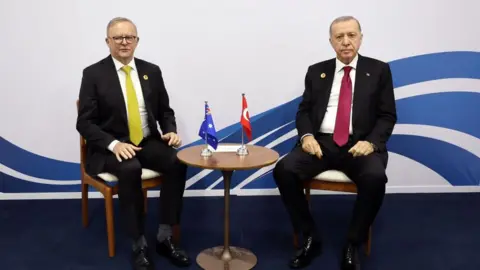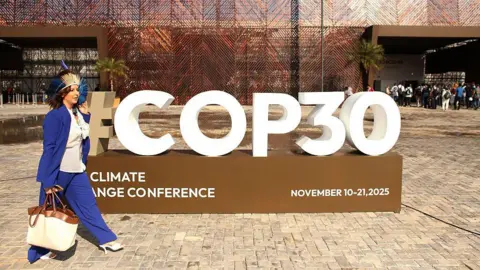Once a sure thing, Australia's bid to host COP31 falters amid deadlock with Turkey
 Getty Images
Getty ImagesOn the banks of the Amazon River delta, business and government officials, campaigners and lobbyists are holed up in meeting rooms in an effort to come up with ideas and action-plans to prevent an impending climate crisis.
Every delegation has its interests, and negotiations at UN climate talks are all about compromise. Which is a problem Australia knows all too well as it engages in parallel negotiations of its own in Belém.
For some time now, there's been a deadlock between Australia and Turkey over who will host next year's meeting – and it all needs to be ironed out by the end of next week when the talks come to a close. If no agreement between the two is reached, hosting will default to the German city of Bonn, where the UN Framework Convention on Climate Change is headquartered.
Brazil would have preferred the matter be sorted out much sooner, mindful that the quiet chatter in COP corridors about the next presidency will soon become deafening, with neither side backing down.
A strong Pacific bid
Back in 2022, Australia put together a convincing proposition of co-hosting COP31 with the Pacific.
A year after focusing on rainforests in Brazil, the oceans would be in the spotlight. Rising sea levels are a constant talking point, and Pacific islanders have the most to lose.
Fiji held the presidency in 2017 but the talks themselves took place in Bonn – 2026 would be a chance for the world to see first-hand the effects of climate change.
For Australia, showing commitment to its neighbours was good domestic politics.
"Having it close to your home means you can create space for the greatest ambition," says Shiva Gounden of Greenpeace Australia Pacific. "The Pacific has always led in trying to come up with ambition that really addresses the climate crisis."
But it was also good geopolitics, putting on a united front with the Pacific, a region where Chinese influence is growing. Australia's position would be strengthened, the Pacific would be put on the map. It felt like a win-win.
Stalemate over hosting
How times change. Now, Australia's bid to co-host COP with the Pacific looks like it's faltering. And possibly failing.
Australia has long maintained it has overwhelming support to host next year's summit.
In fact, more than two years ago, in my conversations with diplomatic sources, there was an extremely confident prediction that this was Australia's bid to lose. It was just a question of coming to a deal with Turkey, but the belief was that that wouldn't be an insurmountable problem.
 Getty Images
Getty ImagesRecently several options have been floated, including reportedly splitting the hosting rights with Ankara.
"There was a fair bit of complacency early on in the process," says Gavan McFadzean of the Australian Conservation Foundation, who is currently in Belém. "[There was] an assumption that an Australian/Pacific joint presidential bid would just sail through."
But Turkey is not budging on its desire to host. While that's not Australia's fault, many feel more could have been done to push Australia's credentials as a climate leader.
At the COP leaders' meeting last week, several dozen leaders attended including the UK's Prime Minister Keir Starmer and French President Emmanuel Macron. President Erdogan of Turkey didn't show up; neither did Australian Prime Minister Anthony Albanese. It's not a strong signal of Australia's commitment.
Speaking to the ABC last week, the president of Palau, Surangel Whipps Jr, who has been one of the biggest Pacific voices when it comes to climate change, said it was "crunch time", arguing that Albanese's presence could hopefully "push Turkiye over the line."
A lot to lose?
Hosting COP was an election promise by Albanese, but it's not a universally popular political move.
While the expense of bringing COP here is often cited by critics - recent reports put it at A$1bn ($650m; 500m pounds) - supporters of hosting COP talk about the investment and tourism it will bring to Australia, especially Adelaide where it would be hosted.
But there's also a lot to lose for Australia more broadly.
There's been a fair bit of criticism over UN climate talks in recent years. Last year, in Azerbaijan, the president said that natural gas was "a gift from God". The year before that, the talks were hosted in Dubai – a city in one of the richest oil states in the world.
Turkey, if it wins, has close ties with the Russia and Saudi Arabia, both countries who have frustrated past efforts to move forward on climate action.
So there was a view that Australia could help turn around the COP brand. The idea being that Australia is one of the "good ones", committed to bringing down emissions and working multilaterally to reach UN goals.
Only there's a big flaw in that argument - Australia is the largest exporter of coal in the world and one of the biggest natural gas exporters. Australia has one of the highest per capita emissions globally.
While Albanese has made strong commitments to tackle climate change - his government recently committed to bringing down emissions in 2035 to between 60 and 72% of 2005 levels - his administration has also recently extended the North West Shelf, one of Australia's largest gas projects.
It's trying to embrace the transition to renewables but knows that its loyalties - and its wealth - lie in fossil fuel exports.
The minister for climate change and energy, Chris Bowen, has been a huge champion of Australia co-hosting COP. But several sources have told me that Albanese and Foreign Minister Penny Wong have been less than enthusiastic about the prospect.
Does Australia want to come under such scrutiny? Perhaps not everyone in the government will be upset if it can't pull off the bid.
